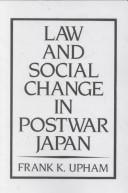| Listing 1 - 6 of 6 |
Sort by
|

ISBN: 0674517865 9780674517868 Year: 1987 Publisher: Cambridge (Mass.): Harvard university press,
Abstract | Keywords | Export | Availability | Bookmark
 Loading...
Loading...Choose an application
- Reference Manager
- EndNote
- RefWorks (Direct export to RefWorks)
Justice, Administration of --- Civil rights --- Sex discrimination against women --- Industrial policy --- Environmental policy --- History --- Law and legislation --- 340 <520> --- J4700.90 --- J4000.90 --- J4128 --- -Environmental policy --- -Industrial policy --- -Justice, Administration of --- -Sex discrimination against women --- -Discrimination against women --- Subordination of women --- Women, Discrimination against --- Feminism --- Sex discrimination --- Women's rights --- Male domination (Social structure) --- Administration of justice --- Law --- Courts --- Business --- Industries --- Industry and state --- Economic policy --- Environment and state --- Environmental control --- Environmental management --- Environmental protection --- Environmental quality --- State and environment --- Environmental auditing --- Basic rights --- Civil liberties --- Constitutional rights --- Fundamental rights --- Rights, Civil --- Constitutional law --- Human rights --- Political persecution --- Rechtsbeginselen. Juridische methodologie.--Japan --- Japan: Law and jurisprudence -- history -- postwar Shōwa (1945- ), Heisei period (1989- ), contemporary --- Japan: Social history, history of civilization -- postwar Shōwa (1945- ), Heisei period (1989- ), contemporary --- Japan: Sociology and anthropology -- human and civil rights, freedom of speech --- Government policy --- 340 <520> Rechtsbeginselen. Juridische methodologie.--Japan --- -Rechtsbeginselen. Juridische methodologie.--Japan --- Justice, Administration of - Japan - History --- Civil rights - Japan - History --- Sex discrimination against women - Law and legislation - Japan --- Industrial policy - Japan - History --- Environmental policy - Japan - History
Book
ISBN: 110853001X 1108534279 1108525385 1108422837 1108436943 Year: 2018 Publisher: Cambridge, England : Cambridge University Press,
Abstract | Keywords | Export | Availability | Bookmark
 Loading...
Loading...Choose an application
- Reference Manager
- EndNote
- RefWorks (Direct export to RefWorks)
In this groundbreaking book, Frank K .Upham uses empirical analysis and economic theory to demonstrate how myths surrounding property law have blinded us to our own past and led us to demand that developing countries implement policies that are mistaken and impossible. Starting in the 16th century with the English enclosures and ending with the World Bank's recent attempt to reform Cambodian land law - while moving through 19th century America, postwar Japan, and contemporary China - Upham dismantles the virtually unchallenged assertion that growth cannot occur without stable legal property rights, and shows how rapid growth can come only through the destruction of pre-existing property structures and their replacement by more productive ones. He argues persuasively for the replacement of Western myths and theoretical simplifications with nuanced approaches to growth and development that are sensitive to complexity and difference and responsive to the political and social factors essential to successful broad-based development.
Right of property --- Law and economic development. --- Law and economics. --- Economics and jurisprudence --- Economics and law --- Jurisprudence and economics --- Economics --- Jurisprudence --- Economic development and law --- Law and development --- Economic development --- Ownership of property --- Private ownership of property, Right of --- Private property, Right of --- Property, Right of --- Property rights --- Right of private ownership of property --- Right of private property --- Right to property --- Civil rights --- Property --- Economic aspects. --- Law and legislation
Book

ISBN: 9781501733147 Year: 2019 Publisher: Ithaca, NY
Abstract | Keywords | Export | Availability | Bookmark
 Loading...
Loading...Choose an application
- Reference Manager
- EndNote
- RefWorks (Direct export to RefWorks)
Multi

ISBN: 9781501733147 Year: 2019 Publisher: Ithaca, N.Y. Cornell University Press
Abstract | Keywords | Export | Availability | Bookmark
 Loading...
Loading...Choose an application
- Reference Manager
- EndNote
- RefWorks (Direct export to RefWorks)
Book

ISBN: 9781501722158 Year: 2018 Publisher: Ithaca, NY
Abstract | Keywords | Export | Availability | Bookmark
 Loading...
Loading...Choose an application
- Reference Manager
- EndNote
- RefWorks (Direct export to RefWorks)
Digital

ISBN: 9781501722158 Year: 2018 Publisher: Ithaca, N.Y. Cornell University Press
Abstract | Keywords | Export | Availability | Bookmark
 Loading...
Loading...Choose an application
- Reference Manager
- EndNote
- RefWorks (Direct export to RefWorks)
| Listing 1 - 6 of 6 |
Sort by
|

 Search
Search Feedback
Feedback About UniCat
About UniCat  Help
Help News
News